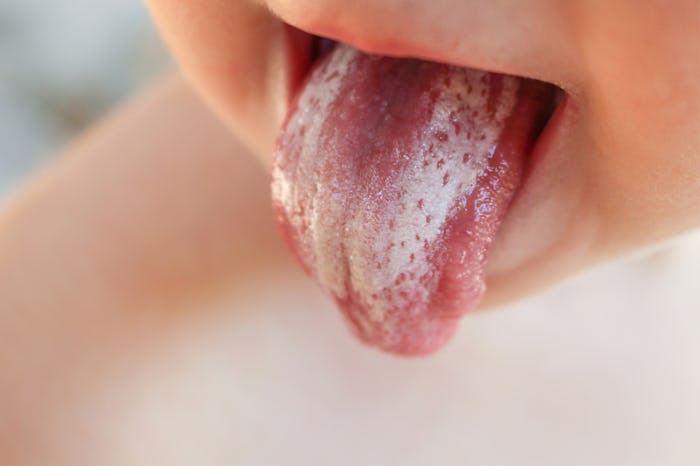Life

5 Reasons Breastfed Babies Get Thrush
Breastfeeding comes with many benefits, but that doesn't mean it's a total walk in the park. Occasionally there are issues that crop up, causing problems for both mother and baby. Generally, the sometimes not-so-fun side effects of breastfeeding can be solved fairly quickly and are nothing to be too alarmed about. One such infection is thrush. If you're concerned about your baby getting it, you may wonder about the reasons breastfed babies get thrush. Knowing what causes thrush might not completely prevent it, but it's certainly possible to reduce the risk.
According to WebMD, thrush an infection caused by the candida fungus — or yeast — that appears in your mouth. The site noted that it's most common in babies, toddlers, and older adults. Additionally, La Leche League International (LLLI) noted that thrush in breastfed babies may show up a few different ways. Yo may notice white patches on the inside of the mouth, cheeks, or tongue, and even a diaper rash. Babies with thrush may also refuse the breast or have a reluctance to breastfeed because their mouth is sore.
Thrush is nothing to get overly concerned about, but it is something you'll want to treat right away. Here are five ways your baby might get thrush to watch out for.
1The Mother Has Yeast Infection In Her Vagina During Birth
"Babies [can] acquire candida from the mother's vagina during birth and that may cause oral thrush," Dr. Preeti Puranik tells Romper. Obviously this pretains to any newborn, breastfeeding or not, but it's a possibility.
If you're close to your due date it might be a good idea to be extra diligent about hygiene and ask your doctor for an exam if you're having symptoms of a yeast infection. According to the Mayo Clinic, yeast infection symptoms include vaginal itching, soreness, pain when urinating, or cottage cheese like discharge.
2The Mother Has Cracked Nipples
"A proper latch is key to all things breastfeeding and when latch isn't correct mom can get cracked nipples where candida can thrive," Liza Maltz, a certified lactation counselor and founder of Birth Your Own Way, tells Romper. When you first start breastfeeding cracked nipples are pretty normal. If, however, you notice sore or cracked nipples after a few weeks you may want to make an appointment with a lactation consultant. They'll be able to examine your latch and help you make necessary adjustments to prevent feeding problems and thrush.
3The Baby Has Been Treated With Antibiotics
"Babies who have recently been treated with antibiotics are at an increased risk of getting thrush," Dr. Eboni Hollier with Developmental and Behavioral Pediatrics of Greater Houston, tells Romper. "Antibiotics decrease the amount of healthy bacteria in your mouth which may allow levels of candida to increase."
If your baby is already showing signs of thrush following a course of antibiotics, you can try a home remedy first. "A very effective homeopathic treatment for thrush (when caught early while the infection is still very mild) is to open a capsule of probiotics, such as Bifidophilus, and sprinkle a tiny amount of the powder in the baby's mouth," Dr. Rallie McAllister, a family physician and co-author of The Mommy MD Guide to Your Baby’s First Year, tells Romper. "Probiotics are beneficial bacteria that normally inhabit the skin, mouth, and digestive tract, and they help keep other, less desirable organisms (such as yeast) under control."
4The Mom Has Recently Been Treated With Antibiotics
It's obvious that breastfeeding moms share a lot with their babies, like life sustaining food. Unfortunately, this sharing can also include unpleasant germs and infections. "If a mom is breastfeeding and has recently taken antibiotics, this may lower the levels of healthy bacteria in her body and may in turn make her more likely to get a fungal infection," Hollier says. "If she does get such an infection, she may pass it along to her baby during breastfeeding."
5Breastfeeding Equipment Isn't Sterilized Properly
It's unclear if thrush can be prevented, but there are several things parents can do to lessen the risk. "It is important that parents always wash their hands after changing the baby's diaper to help prevent thrush because it can be passed through his digestive system," Hollier says. Additionally, she recommends that objects which frequently come into contact with a baby's mouth be washed frequently and adequately. "Pacifiers and toys should be sterilized in boiling water or discarded to help prevent infections or reinfections," Hollier adds. She also recommends that all bottles or feeding equipment be sterilized frequently to help prevent thrush.
As said, thrush is super common in babies so there's no reason to freak out about it. All you can do is stay observant and try to treat any underlying issues that may cause thrush in the first place.